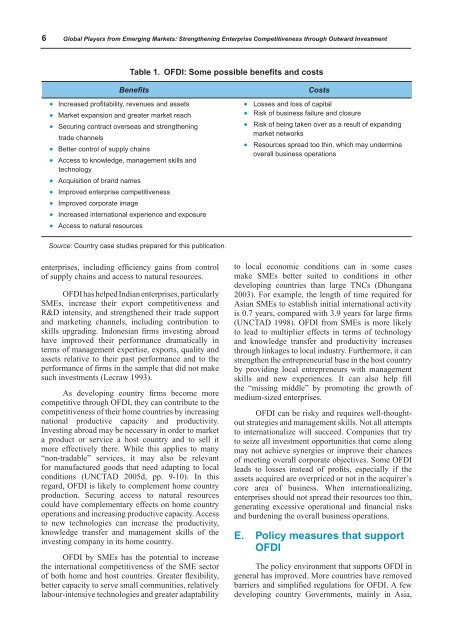Global Players from Emerging Markets: Strengthening ... - Unctad
Global Players from Emerging Markets: Strengthening ... - Unctad
Global Players from Emerging Markets: Strengthening ... - Unctad
You also want an ePaper? Increase the reach of your titles
YUMPU automatically turns print PDFs into web optimized ePapers that Google loves.
6 <strong>Global</strong> <strong>Players</strong> <strong>from</strong> <strong>Emerging</strong> <strong>Markets</strong>: <strong>Strengthening</strong> Enterprise Competitiveness through Outward Investment<br />
enterprises, including efficiency gains <strong>from</strong> control<br />
of supply chains and access to natural resources.<br />
Table 1. OFDI: Some possible benefits and costs<br />
Benefits Costs<br />
� Increased profitability, revenues and assets<br />
� Market expansion and greater market reach<br />
� Securing contract overseas and strengthening<br />
trade channels<br />
� Better control of supply chains<br />
� Access to knowledge, management skills and<br />
technology<br />
� Acquisition of brand names<br />
� Improved enterprise competitiveness<br />
� Improved corporate image<br />
� Increased international experience and exposure<br />
� Access to natural resources<br />
Source: Country case studies prepared for this publication.<br />
OFDI has helped Indian enterprises, particularly<br />
SMEs, increase their export competitiveness and<br />
R&D intensity, and strengthened their trade support<br />
and marketing channels, including contribution to<br />
skills upgrading. Indonesian firms investing abroad<br />
have improved their performance dramatically in<br />
terms of management expertise, exports, quality and<br />
assets relative to their past performance and to the<br />
performance of firms in the sample that did not make<br />
such investments (Lecraw 1993).<br />
As developing country firms become more<br />
competitive through OFDI, they can contribute to the<br />
competitiveness of their home countries by increasing<br />
national productive capacity and productivity.<br />
Investing abroad may be necessary in order to market<br />
a product or service a host country and to sell it<br />
more effectively there. While this applies to many<br />
“non-tradable” services, it may also be relevant<br />
for manufactured goods that need adapting to local<br />
conditions (UNCTAD 2005d, pp. 9-10). In this<br />
regard, OFDI is likely to complement home country<br />
production. Securing access to natural resources<br />
could have complementary effects on home country<br />
operations and increasing productive capacity. Access<br />
to new technologies can increase the productivity,<br />
knowledge transfer and management skills of the<br />
investing company in its home country.<br />
OFDI by SMEs has the potential to increase<br />
the international competitiveness of the SME sector<br />
of both home and host countries. Greater flexibility,<br />
better capacity to serve small communities, relatively<br />
labour-intensive technologies and greater adaptability<br />
� Losses and loss of capital<br />
� Risk of business failure and closure<br />
� Risk of being taken over as a result of expanding<br />
market networks<br />
� Resources spread too thin, which may undermine<br />
overall business operations<br />
to local economic conditions can in some cases<br />
make SMEs better suited to conditions in other<br />
developing countries than large TNCs (Dhungana<br />
2003). For example, the length of time required for<br />
Asian SMEs to establish initial international activity<br />
is 0.7 years, compared with 3.9 years for large firms<br />
(UNCTAD 1998). OFDI <strong>from</strong> SMEs is more likely<br />
to lead to multiplier effects in terms of technology<br />
and knowledge transfer and productivity increases<br />
through linkages to local industry. Furthermore, it can<br />
strengthen the entrepreneurial base in the host country<br />
by providing local entrepreneurs with management<br />
skills and new experiences. It can also help fill<br />
the “missing middle” by promoting the growth of<br />
medium-sized enterprises.<br />
OFDI can be risky and requires well-thoughtout<br />
strategies and management skills. Not all attempts<br />
to internationalize will succeed. Companies that try<br />
to seize all investment opportunities that come along<br />
may not achieve synergies or improve their chances<br />
of meeting overall corporate objectives. Some OFDI<br />
leads to losses instead of profits, especially if the<br />
assets acquired are overpriced or not in the acquirer’s<br />
core area of business. When internationalizing,<br />
enterprises should not spread their resources too thin,<br />
generating excessive operational and financial risks<br />
and burdening the overall business operations.<br />
E. Policy measures that support<br />
OFDI<br />
The policy environment that supports OFDI in<br />
general has improved. More countries have removed<br />
barriers and simplified regulations for OFDI. A few<br />
developing country Governments, mainly in Asia,

















